Related Research Articles
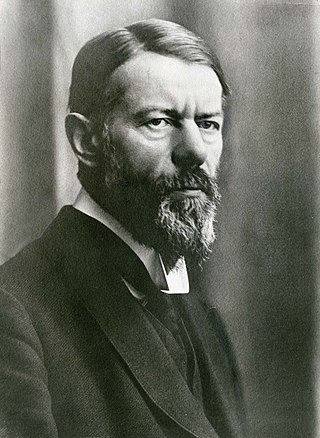
Maximilian Carl Emil Weber was a German sociologist, historian, jurist, and political economist who was one of the central figures in the development of sociology and the social sciences more generally. His ideas continue to influence social theory and research.

Karl Mannheim was a Hungarian sociologist and a key figure in classical sociology as well as one of the founders of the sociology of knowledge. Mannheim is best known for his book Ideology and Utopia (1929/1936), in which he distinguishes between partial and total ideologies, the latter representing comprehensive worldviews distinctive to particular social groups, and also between ideologies that provide support for existing social arrangements, and utopias, which look to the future and propose a transformation of society.

The University of Göttingen, officially the Georg August University of Göttingen, is a public research university in the city of Göttingen, Lower Saxony, Germany. Founded in 1734 by George II, King of Great Britain and Elector of Hanover, it began instruction in 1737 and is recognized as the oldest university in Lower Saxony.
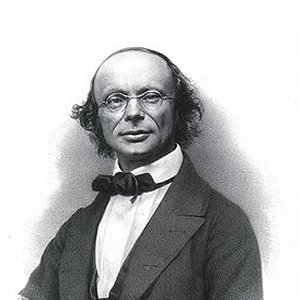
Wilhelm Eduard Weber was a German physicist and, together with Carl Friedrich Gauss, inventor of the first electromagnetic telegraph.

The historical school of economics was an approach to academic economics and to public administration that emerged in the 19th century in Germany, and held sway there until well into the 20th century. The professors involved compiled massive economic histories of Germany and Europe. Numerous Americans were their students. The school was opposed by theoretical economists. Prominent leaders included Gustav von Schmoller (1838–1917), and Max Weber (1864–1920) in Germany, and Joseph Schumpeter (1883–1950) in Austria and the United States.

Leipzig University, in Leipzig in Saxony, Germany, is one of the world's oldest universities and the second-oldest university in Germany. The university was founded on 2 December 1409 by Frederick I, Elector of Saxony and his brother William II, Margrave of Meissen, and originally comprised the four scholastic faculties. Since its inception, the university has engaged in teaching and research for over 600 years without interruption.

The Protestant Ethic and the Spirit of Capitalism is a book written by Max Weber, a German sociologist, economist, and politician. It began as a series of essays, the original German text was composed in 1904 and '05, and was translated into English for the first time by American sociologist Talcott Parsons in 1930. It is considered a founding text in economic sociology and a milestone contribution to sociological thought in general.
Reinhard Bendix was a German-American sociologist.

Ernst Peter Wilhelm Troeltsch was a German liberal Protestant theologian, a writer on the philosophy of religion and the philosophy of history, and a classical liberal politician. He was a member of the history of religions school. His work was a synthesis of a number of strands, drawing on Albrecht Ritschl, Max Weber's conception of sociology, and the Baden school of neo-Kantianism.
Wolfgang Justin Mommsen was a German historian. He was the twin brother of historian Hans Mommsen and the great-grandson of Theodor Mommsen.

The University of Erfurt is a public university located in Erfurt, the capital city of the German state of Thuringia. It was founded in 1379, and closed in 1816. It was re-established in 1994, three years after German reunification. Therefore, it claims to be both the oldest and youngest university in Germany. The institution identifies itself as a reform university, due to its most famous alumnus Martin Luther, the instigator of the Reformation, who studied there from 1501 to 1505. Today, the main foci centre on multidisciplinarity, internationality, and mentoring.
Jürgen Osterhammel is a German historian specialized in Chinese and world history. He is professor emeritus at the University of Konstanz.
Toby E. Huff is an American academic and emeritus professor at the University of Massachusetts Dartmouth. He was born in Portland, Maine. He was trained as a sociologist but has research interests in the history, philosophy and sociology of science. He has published Weber-inspired studies of the Arab and Muslim world, as well as China, including field work in Malaysia. He is best known for his book The Rise of Early Modern Science: Islam, China and the West. Now in a third edition, it has been translated into Arabic (twice), Chinese, Korean, and Turkish. His explanation of the cultural and scientific divergence between Arabic/Islamic and European science in the medieval period has been widely influential, especially among economic historians such as Richard Lipsey, Jan Luiten van Zanden, Peer Vries, among others.
The history of emotions is a field of historical research concerned with human emotion, especially variations among cultures and historical periods in the experience and expression of emotions. Beginning in the 20th century with writers such as Lucien Febvre and Peter Gay, an expanding range of methodological approaches is being applied.

The Max Weber Center for Advanced Studies is an international and interdisciplinary "high-ranking research centre which forms an avant-garde institution of the University of Erfurt," according to the European Commission's CORDIS. The Center's focal areas include "religion, science, and law as powers of interpretation and governance; interactions among cultures; social orderings and mentalities in radical change; and normative—in particular, ethical—issues."
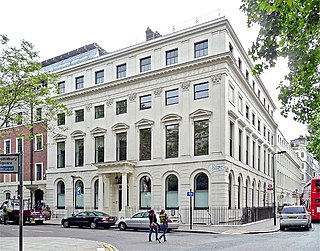
The German Historical Institute London (GHIL) is one of the nine independent academic research institutes of the German Historical Institute that are part of the Max Weber Foundation.
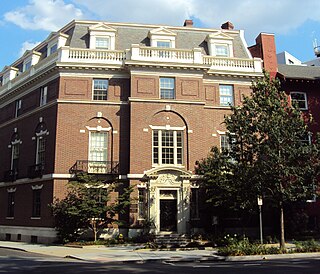
The German Historical Institute Washington DC is an institute of historical study based in Washington, D.C. It has been part of the Max Weber Foundation: German Humanities Institutes Abroad since 2002. The director is Simone Lässig.
The Max Weber Foundation is a German humanities research organisation based in Bonn and funded by the German Federal Government. It is composed of eleven independent institutes:
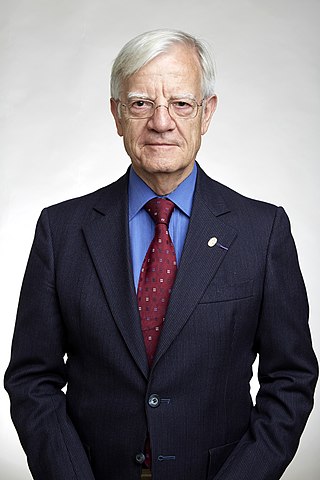
Albrecht Werner Hofmann is a German geochemist who is emeritus professor at the Max Planck Institute for Chemistry and an adjunct professor at Columbia University. He is best known for his contributions to the field of geochemistry.
Hartmut Lehmann is a German historian of modern history who specializes in religious and social history. He is known for his research on Pietism, secularization, religion and nationalism, transatlantic studies and Martin Luther. He was the founding director of the German Historical Institute Washington DC and was a director of the Max Planck Institute for History. He is an emeritus honorary professor at Kiel University and the University of Göttingen.
References
- ↑ Institutes. Max Weber Stiftung. Retrieved 3 November 2017.
- ↑ German Historical Institute: 40 year anniversary. German Historical Institute, London, 2016. p. 4.